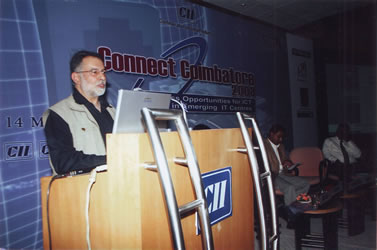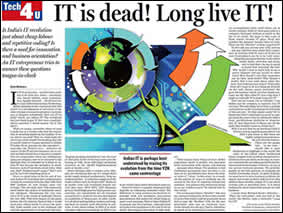2008
Guessing Games
June 2008 – IT Magazine
I don’t know if you’ve ever dwelled on the other meaning of the word ‘lies’ in the adage, “Beauty lies in the eyes of the beholder”. Could it mean the opposite of ‘truth’? Or does it mean ‘exists’? My take is that this sentence has become so famous only because of its not-so-obvious meaning. [Pun]nily enough, it probably tells us that beauty is not an absolute attribute–it is the emotional response of the beholder in whose perception it is ‘seen’. We have to learn to play the guessing game and understand the unwritten rules of the markets of today and tomorrow. Our success ‘lies’ in the minds of those who use the solutions we offer.
Inconvenient Truths
May 2008 – IT Magazine
In March this year I had the opportunity of addressing the CII (Confederation of Indian Industry) meet in Coimbatore and was pleasantly surprised by the initiatives of the Tamilnadu government in creating state-of-theart IT infrastructure across the state. While the government is doing its bit by providing the superstructure, entrepreneurs and technology ventures are trying to understand how to leverage this to create enterprises of the future. One of the topics I highlighted was the need for technology professionals to position themselves as global thought leaders and follow it up by effectively presenting ideas and content in a manner that international customers relate to. In this article I make a departure from the nuts and bolts of IT and attempt to highlight some ‘soft’ signs that have gone unnoticed, since they do not qualify as ‘accounting’ measurements.
Not the [W]hole Story
April 2008 – IT Magazine
Imagine if we could step out of our hole–or box, if you please–and think outside of it. Would it then give us the freedom to think of technology as an enabler, rather than an alternative to human beings? Would it allow us to recognise that people are different from machines? Would it not be easier to balance efficiency with effectiveness? I see a vastly expanded horizon of possibilities that lead to highly enriching and sustainable opportunities. I might want to suggest that stepping out of the box could mean stepping into a new age marked by ‘generalisation’.
First Dot The ‘i’
March 2008 — IT Magazine
We (IT professionals) must first pledge to deal with information; we must look for the right information in the right places, and bring all of it together into the socio-technical context. All else will follow logically–even technology.
Business Innovation
CAN INNOVATION BE TAUGHT?
March 2008 — LUNAR DESIGN’S PODCAST
Can innovation be taught or is it embedded in creativity? How is India becoming an innovator in the world of outsourcing? IdeaFarms CEO Sunil Malhotra discusses innovation and India with Lunar’s John Edson. Link to Lunar’s podcast site – http://www.lunar.com/podcast/index.html Link to Icon-o-cast blog — http://iconocast.typepad.com/
Ideafarms believes in Smart-Sourcing
21 March 2008, Coimbatore- The Hindu Business Line
New Delhi-based Idea Farms concept of outsourcing IT services offers an entirely different value proposition. Its CEO and President, Mr Sunil Malhotra, said ‘when I decided to set up this IT services company seven years back, I was convinced that there were enough players offering solutions to drive a company’s top line and bottom line, but not any focusing on the middle or inter disciplinary path. We chose the smart sourcing route.’ IT smart sourcing, according to Mr Malhotra, is in providing enhanced business value through disruptive thinking and innovation. ‘I believe in provoking the mind,’ says this post-graduate in Industrial Design.
Car ke side effects
February 2008 — IT Magazine
I met my namesake on the plane to Frankfurt–a co-traveller if you wish–and before we turned in for the night, we ended up talking about the much-awaited ‘Rs 1 lakh car’ from the Tata stable. I was reminded of another recent conversation with a potential client, during which we spoke of ‘holistic’ and sustainable approaches to business and society.
The Business of Culture as the Culture of Business!
January 2008 — IT Magazine
“A culture is an organisation’s collective mindset–its beliefs, intentions, and memories,” said Mark Youngblood in his 1997 book, Life at the Edge of Chaos: Creating the Quantum Organisation. “Organisations that will survive and prosper in the 21st century will be fast, flexible, responsive, resilient, creative, balanced, and full of vitality.” He calls these companies Quantum Organisations. Quantum Organisations, in direct contrast with the machine-like design of industrial era companies, operate using the principles of living systems. They are organic webs of life: dynamic, interconnected networks of relationships that are constantly learning, adapting and evolving.
2007
What’s So Bad About Feeling Good?
December 2007 — IT Magazine
What could we do about our programming attitude? Especially since most of what we are doing in India is IT services. What I am about to say might not go down so well with the Indian IT community–and I would have to include my own company as well. I am talking about the quality of the software we develop–as products, as services and in whichever other conceivable form.
“When can my boss test drive the application?”
November 2007 — IT Magazine
Sales guy: (… thinking about his commissions) Thank you for the order, Sir! We will start development right away now that the Requirements Book is signed off . Client IT guy: Great. So we’ll have our software installed by end of next year. Right? Sales guy: Sure. We will send you the project plan–deliverables, milestones, test reports, time sheets–and the payment schedules. Client IT guy:(… dreaming of utopia). Thanks. Could you arrange for us to see what the application will look like … next month? Sales guy: (… mumbling to himself … this guy must be from Mars!) PARDON ME? Business leaders everywhere have started caring less and less about how IT guys build an application. All they want to know, early, is what they can expect in their whole experience with the application.
The ‘Original’ Sin
October 2007 — IT Magazine
What’s the recipe for that breakthrough product? Innovation or invention? Hardcore originality or smart thinking on your feet? Read on to discover more about making ‘all the difference’.
What do I care what my client thinks?
September 2007 — IT Magazine
I heard a recent speech by Anu Aga, former chairperson of the Thermax Group, where she borrowed a thought from Miles Kington, “Knowledge tells you that a tomato is a fruit. Wisdom tells you not to put it in the fruit salad!” Although she used it in a different context, I found it appropriate in the context of IT. Wise IT entrepreneurs (however much of an oxymoron that might seem) know that technology is a tomato. Their wisdom, however, tells them that it is not the business itself.
IT is dead! Long live IT!
By Sunil Malhotra
21 September 2007 — Hindustan Times
I love oxymorons, — and they have nothing to do with airy idiots — retrofuturism, hitech fashion, mass customisation, happily married … the list goes on. I’ve just added Information Technology. Before jumping to the conclusion that this article is a proclamation of accession or another attempt at sensationalisation, I provoke you to disagree vehemently. How can IT be dead? Surely not Indian IT! The revolution has just about begun. If this were a multiple-choice question, I would answer ‘All of the above’.
Read more
SShhhhhhhhhh … Innovation Secure
August 2007 — IT Magazine
You must neither reveal too much about an innovative product or service before marketing (or patenting) it, nor be too secretive about it. Success lies in how well you are able to strike a balance between secrecy and communication. Here are some pointers.
The Desi Web
Is ‘Made In India’ a unique selling proposition on the Web? Everybody seems to be launching Web products for, of and by Indians! A year later, it’s probable that only the cream will remain, because the ‘100 per cent Indian’ tag alone cannot draw traffic to a site anymore. To stay in business, a website has to be innovative, unique and able to offer high value to users.
Small is Big: Working with Boutique Providers
By Rinku Tyagi
Global Services — Monday, July 30, 2007
A few years ago when an industrial-design dropout decided to set up an IT-services firm, he knew that the big fish in the sea had all that was needed to survive — process maturity, proven track record and deep pockets to grab any customer, big or small — unlike him who just had a vision to offer innovative solutions, something that these biggies did not. Sunil Malhotra, the founder and CEO of a very small IT-solutions firm, knew he had to build his core competency somewhere else. He chose interdisciplinary capabilities, ideas and innovation to be it. And that remains the seed of his venture called Ideafarms, where he and his team of 30 work toward not delivering a good cost or technology model, but ideas.
2006
Continental dumps IBM, picks Ideafarms among vendors
1 Sep 2006:
Continental AG, the $17-billion German automotive maker, has opted for a four-year old Delhi-based start-up — Ideafarms — as one of its key partners to handle its global IT tasks. Ideafarms now joins the ranks of HP, EDS and Wipro, the current IT-outsourcing partners of Continental. Interestingly, Continental terminated a 10-year multi billion dollar deal with IBM to opt for a multi-vendor strategy, which now includes the start-up, Ideafarms. As part of the deal, Continental AG, in partnership with Ideafarms, will set up a Global IT Competence Centre in Delhi. As part of this new sourcing strategy, Continental AG proposes to reallocate 25% of its niche IT-sourcing spend to Ideafarms and other such facilities. Shelley Singh & Moumita Bakshi Chatterjee met up with Continental AG V-P & CIO Paul Schwefer to discuss its IT-sourcing strategy and future plans.
Continental AG plans Global IT Competence Centre in India. Partners New Delhi based Ideafarms for innovative valueadded services.
31 Aug 2006:
New Delhi, 31 August 2006: Continental AG, a leading automotive supplier of brake systems, chassis components, vehicle electronics, tires and technical elastomers, today announced plans to set up a Global IT Competence Centre in India with New Delhi based Ideafarms — a niche IT smart-sourcing firm offering global delivery. The activity will be one of Continental’s major initiatives in the subcontinent. As part of its new sourcing strategy, Continental proposes to reallocate a substantial 25% of its niche IT sourcing spend for such ‘best-in-class’ facilities.
2005
‘We need partners, not vendors’
Schwefer’s philosophy on outsourcing is that you can outsource some key functions only to someone whom you can trust, who behaves like a partner, who is attuned to your needs as well as business culture so that he can think of solutions along with you, rather than merely execute the functions you have already thought of.
Read more
![]() Search Ideafarms News – Google
Search Ideafarms News – Google ![]() Search Ideafarms News – Yahoo
Search Ideafarms News – Yahoo



